- Home
- Richard Lee Byers
The Haunted Lands: Book III - Unholy Page 2
The Haunted Lands: Book III - Unholy Read online
Page 2
He leveled the spear, rattled off a tercet, and power groaned through the air. Seven rays of light, each a different color, blazed from the spear like a whip made of rainbows to lash the jarliths.
One jarlith turned to gray, unmoving stone. The other froze and jerked in spasms as arcs of lightning danced across its body. But when the sizzling, popping effect blinked out of existence, it charged.
Aoth braced the butt of the spear against the floor and impaled the cat as it sprang. The impact jolted him but failed to knock him over. The jarlith’s razor-sharp talons slashed the air in front of his face, falling short by the length of his little finger. Meanwhile the wheel of blades sliced into its guts again and again and again, and he sent destructive power stored in the spear burning up the shaft and point and into the creature’s body.
The jarlith screamed and then went limp. Aoth dumped the carcass on the floor, yanked the spear out of it, and turned to see which of his comrades needed help.
Neither of them.
Mirror and the palrethee were fighting sword against sword. The ghost had changed again, into something approximating the form he’d worn in life, or so his friends believed: the appearance of a thin warrior with a drooping mustache and a melancholy countenance, armored in a hauberk and carrying a targe on his arm. Sometimes he shifted the shield to catch the strokes of the blazing sword. At other moments, the demon’s weapon seemed to whiz harmlessly through his insubstantial body.
Meanwhile, he landed cut after cut on the demon, his shadowy blade plunging deep into its starveling torso. Strangely, whenever he did, the palrethee jerked, but Mirror’s form wavered, too, like a mirage threatening to flicker out of existence. It was as if he couldn’t strike this creature shrouded in hellfire without hurting himself as well. But every time, his shape reasserted itself, reclaiming as much definition as it ever possessed.
Bareris was using his sword, too, but defensively, just to hold the vaporighu back while he attacked with his voice. Aoth could feel the fearful, disorienting power in the keening melody. It was magic devised to rip a mind to pieces.
The vaporighu dropped to its knees, pawed at its head, and tore away pieces of its own decaying flesh. Bareris gripped his sword with both hands, stepped in, and decapitated the demon.
At virtually the same instant, Mirror plunged his sword into the palrethee’s chest, and its halo of flame blinked out. Its already emaciated body shriveled still further, and then it pitched forward onto its face.
Bareris sang a final descending phrase that brought his battle anthem to a conclusion. Aoth took another look around for onrushing demons or slinking crossbowmen. He didn’t see any, and his instincts told him the fight was over. All the demons were dead, and any surviving human assassins had fled the scene.
He realized how winded he was and drew a deep breath. “It’s good to see the two of you. Better than good. But what are you doing here? Did you know someone was going to try to murder me?”
“No,” Mirror said. “We came in search of you because we need your help. It’s the mercy of the gods that we tracked you down just in time to aid you. Who wanted you dead, do you know?”
“Nevron, almost certainly.” The Spellplague had changed everything, including magic itself. The specialized disciplines that formed the basis of the old Thayan Orders of Red Wizardry had largely passed from the scene. But Aoth was certain that the former zulkir of Conjuration still commanded a veritable army of demons and devils.
“We have to talk,” Bareris rapped.
“We will,” said Aoth, “of course. But I have to finish figuring out what happened here. There’s at least a chance Lady Quamara and some of the servants are still alive.”
They weren’t alive. Aoth and his comrades found the bloody corpses in the wine cellar.
Mirror recited a brief prayer for the fallen and swept his semitransparent hand through a semicircular ritual pass. Millennia ago, he’d been a knight pledged to the service of a beneficent deity, almost a priest, in fact, and he still practiced his devotions despite the seeming paradox of an undead spirit invoking the holy. When he finished, he said, “I’m sorry. Were the two of you in love?”
Aoth sighed. “No. I was her amusement, and she was mine. But she was a sweet lass. She certainly didn’t deserve to end like this. Nor did these others, I suppose.”
“Now can we talk?” Bareris asked.
“No!” Aoth had half forgotten how the bard’s grim single-mindedness used to annoy him. “I have to tell Quamara’s brother and the city authorities what happened, and it’s probably best that I do it without involving you. I know the undead are accepted in Thay, but Aglarond’s a different matter. I’ll meet you at my own house as soon as possible.”
“As soon as possible” turned out to be dawn, but luckily, unlike many undead, both his rescuers could endure sunlight. He ushered them into his house and study and found Khouryn snoring on the floor with his urgrosh lying beside him.
“He’s all right,” said Mirror quickly. “He wouldn’t tell us where you were, so Bareris forced him. At the time, I didn’t approve, but since you were actually in danger, I’ll concede that his instincts were on target.”
“You’re sure Khouryn’s all right?” asked Aoth.
“Yes. I can rouse him if you like, but it might be better to let him wake naturally.”
“That’s what we’ll do, then.” After all, Mirror had a master healer’s knowledge and discernment, even if his chill touch was poisonous except for those moments when he deliberately channeled the power of his unknown god. Aoth bent over, picked up Khouryn with a grunt—dwarf soldiers were damn heavy, considering their stature—and deposited him on a divan.
He then dropped into a chair. “Sit if you like,” he said. And they did, although Mirror’s shadowy, faceless form seemed to float in the general vicinity of the stool he’d chosen, as opposed to actually resting on it. His shape and the seat’s even appeared to interpenetrate a little. “Now tell me what’s going on.”
Bareris smiled bitterly. “Perhaps the easiest way to explain is to tell a story.”
chapter one
Midwinter, The Year of the Dark Circle (1478 DR)
His boots crunching in the snow, Bareris walked the tangled backstreets of Eltabbar and sang a spell under his breath. Over time, the enchantment altered his appearance. Filthy rags mended themselves and turned to shining silk and velvet. His hand-and-a-half sword became a short, slender blade with a jeweled hilt and scabbard, and his brigandine vanished altogether. All the hair on his head disappeared as well, his eyes displayed discernible whites and irises once more, and his canine teeth lengthened into fangs. But it all happened slowly enough that no passerby, glancing casually in his direction, would notice the transformation.
Not that there was anyone to see, no one but Mirror flowing along as an invisible sensation of hollowness and wrongness at his side. Once, no matter how cold the weather, the streets would have teemed with folk celebrating the Midwinter Festival. These days, ordinary people took care to conclude their revelry, or the open-air portion of it, anyway, before the sun went down. They feared to encounter their masters when the latter were in a playful mood.
Bareris and Mirror emerged from a twisting lane too narrow to accommodate a wagon onto a broader, straighter thoroughfare. On the far side of an arching bridge spanning a frozen canal, their destination glowed with silvery phosphorescence. Sleighs, coaches, and litters waited in line to deposit their passengers under the porte cochere of a stone house with turrets at the four corners of the peaked slate roof. A luminous, runic emblem inlaid above the door, its shape and color in constant flux, revealed that at one time, the mansion had belonged to the extinct Order of Transmutation.
“I don’t much like this,” Mirror murmured. It was the first time he’d spoken in three days. Evidently he was coming out of his latest bout of ghostly disorientation or whatever it was, just in time to fret.
“My disguise will hold up,” Bareris said. “Y
ou just remain as near to imperceptible as you can get.”
“Even if they don’t recognize us, there are plenty of other things that can go wrong.”
“I don’t care. This Muthoth bastard is one of Sylora Salm’s chief deputies. There’s a fair chance she’ll put in an appearance. And even if she doesn’t, there’ll be other people to kill.” He strode toward the bridge and felt Mirror glide along in his wake.
As Bareris spoke to one of the slaves minding the entryway, he infused his voice with magic. The enchantment persuaded the lackey that he saw an invitation in the newcomer’s empty hand, and he and a fellow servant swung open the tall, arched double doors.
On the other side was a high-ceilinged marble foyer with several doorways opening off it. Bareris assumed that newly arrived guests were supposed to pass through the one directly opposite the entrance, where an usher waited to thump his staff on the floor and announce them.
But, disguised though he was, Bareris didn’t want all eyes drawn to him or to have his false name and fraudulent title shouted aloud to give every listener the opportunity to reflect that he’d never heard of such a person. He led Mirror into one of the other doorways. If this structure was like other Thayan mansions of his experience, a series of interconnecting rooms and passages should provide a less conspicuous means of access to Muthoth’s great hall.
Some of the lesser chambers were occupied. In one, a withered husk of a creature robed in red, still the color reserved for the realm’s most powerful wizards, sat talking with another malodorous corpse wearing the silver skull-and-crossed-swords badge of an order of undead knights. In another, the hulking, red-eyed undead called boneclaws, Muthoth’s household guards of choice, gripped naked prisoners in their enormous, jointed talons. Several guests hovered around the captives, shouting in their ears, pinching them, or jabbing at their eyes with stiffened fingers. Bareris gathered that the object of the game was to make a victim flinch and gash himself against a boneclaw’s razor-sharp fingers, and that this was a sport on which the players had decided to gamble.
One captive had already severed an artery, and his lifeless body sprawled discarded on the floor. The remaining ones wept and pleaded, with blood trickling down their torsos and legs. A lithe female vampire knelt, licked gore off a taut, quivering stomach, and won a silver coin thereby.
Bareris could feel Mirror’s wrath building as if the air at his side were growing colder and colder. “No,” he whispered. “We didn’t come here to rescue anyone.”
“Perhaps we should have.”
“But we didn’t, and without a plan, we’d surely fail. Look, we’ve both been spared all these years for a reason; isn’t that what you keep telling me? So we can’t throw ourselves away. We have to pick our battles and fight intelligently.”
“Move on, then. I don’t promise to hold back if I watch any more of this.”
Another two dozen paces brought them to a doorway opening on the great hall. An orchestra on a dais along the far wall played a pavane, and Bareris felt the old familiar urge, still alive in him when so much else had withered, to immerse himself in the music. He shook it off and surveyed the company instead.
He spotted a reasonable number of living revelers, mostly clad in red, proof that even after a century, Szass Tam hadn’t completely transfigured the aristocracy. But the majority of celebrants were undead, shadowy specters, vampires with alabaster skin and chatoyant eyes, crumbling corpses, fleshless skeletons, and things so misshapen and grotesque they bewildered the eye, perhaps experiments created in the laboratories of the necromancers but granted positions of authority even so.
Good host that he evidently was, Muthoth had provided refreshments for all his guests. Some of the trestle tables proffered food and drink fit for mortals, but prisoners lay chained spread-eagled across others for the undead to devour.
A specter slid his fingers into a boy’s face. The child screamed loud enough to drown out the orchestra as he grew old and died in a matter of moments. An undead ogre, its rotting body armored or perhaps simply held together by a framework of black iron rings and bands, ripped off a woman’s head, then reached up inside her neck to claw out meat and stuff it in his mouth. More thralls waited caged in the corner to replenish the buffet.
Bareris procured a goblet of blood and pretended to sip from it as he sauntered around, eavesdropping, hoping to hear something tonight that would enable him to strike a blow against Szass Tam’s government tomorrow. He might as well. It wasn’t time to start murdering people yet. That would come later, when the revel grew wilder, and excitement and overindulgence left the attendees vulnerable. When more of them wandered from the great hall to other portions of the mansion to pursue intimate pleasures in private, purge themselves, or pass out.
The usher at the primary doorway knocked the butt of his staff on the floor. “Sylora Salm, tharchion of Eltabbar!” Bareris turned and bowed like all the other gentlemen, then lifted his eyes to inspect this foe he’d never seen before.
His first thought was that she was very like Dmitra Flass, who’d held the same office one hundred years before, a perfect example of a great Thayan lady. She was tall and slender, without a trace of hair on her head, and wore a shimmering scarlet gown that was a triumph of the dressmaker’s art. Her ivory complexion was flawless, her smile deceptively warm, and a quick intelligence shined in her bright green eyes.
Perhaps she reflected Szass Tam’s ideal of womanhood. Maybe the lich was genuinely fond of her, as supposedly had been the case with Dmitra. Bareris hoped so. He wanted to believe Szass Tam might actually feel at least a little bereft when she died.
And it should be possible to kill her, her sorcery and bodyguards notwithstanding. The gossips said she possessed a lickerish nature and enjoyed the attentions of vampires. He was disguised as such a creature and could exploit his bardic skills to seduce and beguile. When the opportunity presented itself, he’d lure her away to some private spot, then strike her down before she realized anything was amiss.
Or so he thought until Muthoth hurried out of the crowd to greet the new arrival.
His skinny frame robed in crimson, Sylora’s lieutenant had clearly become a vampire at some point during the past century, but it didn’t matter. Bareris still recognized the sharp, arrogant features, a face made to sneer and spit, and even if he hadn’t, there was no mistaking the maimed right hand with its missing fingers.
“Stop staring!” Mirror whispered.
The phantom was right. Bareris mustn’t make himself conspicuous. With an effort, he turned away.
“What’s wrong?” asked Mirror, barely visible as little more than a man-sized column of blur and ache.
“I told you,” Bareris said, “about the necromancers who took Tammith to Xingax. How I caught up with them on the trail, but they wouldn’t give her back to me.”
“Yes.”
“Well, this Muthoth is one of them. I never knew his name or that he was still around. But now that I do, he’s going to pay.”
“Killing Sylora Salm would better serve the cause.”
“To the Abyss with ‘the cause.’ Muthoth is our target, and he alone.”
Tammith Iltazyarra had been Bareris’s first and only love. And if Muthoth and his pudgy, timid partner had just taken the princely bribe he’d offered and set her free, everything would have been different. Xingax never would have transformed her into a vampire, and Tsagoth wouldn’t have destroyed her. She and Bareris would have shared a long, joyful mortal life together.
Bitter though it was, he’d resigned himself that he almost certainly would never slay Szass Tam, the overlord who controlled all his lesser enemies and was the ultimate source of all his sorrows. Despite decades of scheming, he’d never even managed to kill Tsagoth. But by every melody ever sung, every note ever played, he could take revenge on Muthoth, and he would.
But it wouldn’t prove to be easy. As the revelers danced to song after song, and one by one, the prisoners shrieked, thrashed, and d
ied, Muthoth remained at the heart of the festivities. He seemed to be enjoying the celebration too much, or to be too concerned with the obligations of hospitality, for even the persuasions of a bard to draw him away.
Finally the slaves stopped setting out fresh food, living or otherwise, and the weary musicians switched to tunes less suitable for dancing. Taking the hint, or simply sensing the imminence of sunrise, the guests began to depart.
“What now?” Mirror asked.
“We hide,” Bareris answered.
They stalked back into the lesser rooms. Shredded corpses, the occasional dismembered limb, and pools and spatters of blood now defaced the gorgeous carpets and handsome furnishings, and in some spaces, slaves had already made a start at trying to clean up the mess.
But the cozy room in which the undead sorcerer and knight had sat and chatted was empty. Mirror faded until he was entirely invisible once more. Bareris sang a spell under his breath to achieve the same effect.
Then they waited for the rest of the revelers to leave and the house to settle down. Occasionally slaves trudged or boneclaws prowled past them, but without so much as a suspicious glance in their direction. Finally Bareris said, “It’s time to move.”
“Where?” Mirror asked.
“Whatever Muthoth sleeps in, it’s a reasonable guess that he keeps it in a bedchamber upstairs.”
Still invisible, they made their way to a marble staircase. As they climbed, Bareris felt feverish with eagerness.
At the top of the steps, archways led in three directions. From what he could see, it appeared to Bareris that Muthoth had furnished the rooms directly opposite the stairs with grander, more ostentatious pieces than those visible to the right and left. Which suggested that those chambers comprised his personal suite.
The intruders headed into the more luxurious area and soon entered a large, square room. Bareris just had time to notice that it was strangely empty compared to the two they’d just traversed when the air flared fiery yellow. His head throbbed, reacting to the sudden release of arcane energy.

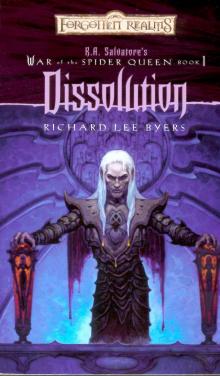 Dissolution
Dissolution Arkham Horror- Ire of the Void
Arkham Horror- Ire of the Void The Haunted Lands: Book II - Undead
The Haunted Lands: Book II - Undead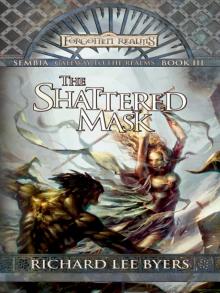 The Shattered Mask
The Shattered Mask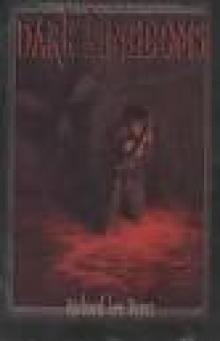 Dark Kingdoms
Dark Kingdoms The Masked Witches: Brotherhood of the Griffon, Book IV
The Masked Witches: Brotherhood of the Griffon, Book IV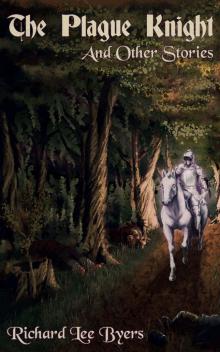 The Plague Knight and Other Stories
The Plague Knight and Other Stories Unclean: The Haunted Lands
Unclean: The Haunted Lands The Captive Flame: Brotherhood of the Griffon • Book 1
The Captive Flame: Brotherhood of the Griffon • Book 1 The Taste of Waterfruit and Other Stories (Story Portals)
The Taste of Waterfruit and Other Stories (Story Portals) The masked witches botg-4
The masked witches botg-4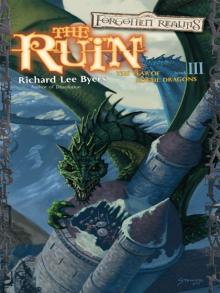 The Ruin
The Ruin The Spectral Blaze botg-3
The Spectral Blaze botg-3 The Masked Witches
The Masked Witches Blind God's bluff bf-1
Blind God's bluff bf-1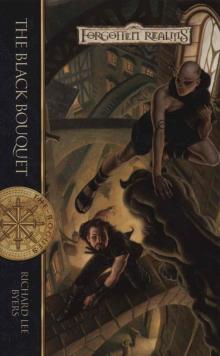 The Black Bouquet r-2
The Black Bouquet r-2 The Rite
The Rite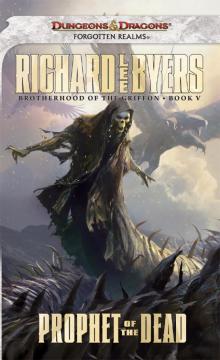 Prophet of the Dead: Forgotten Realms
Prophet of the Dead: Forgotten Realms The Shattered Mask s-3
The Shattered Mask s-3 Called to Darkness
Called to Darkness Undead hl-2
Undead hl-2 Blind God's Bluff: A Billy Fox Novel
Blind God's Bluff: A Billy Fox Novel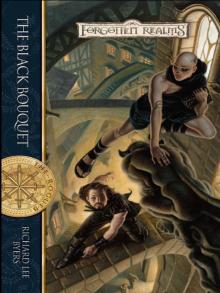 The Black Bouquet
The Black Bouquet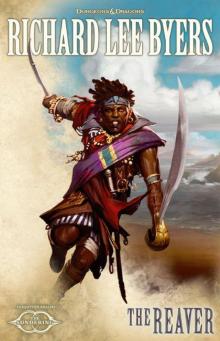 The Reaver
The Reaver The Spectral Blaze: A Forgotten Realms Novel
The Spectral Blaze: A Forgotten Realms Novel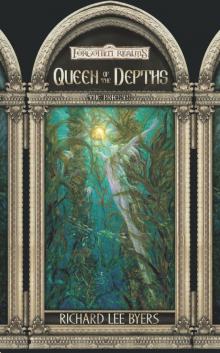 Queen of the Depths
Queen of the Depths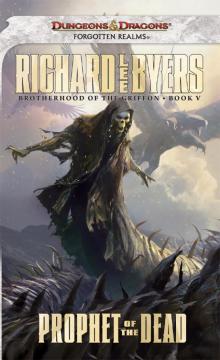 Prophet of the Dead botg-5
Prophet of the Dead botg-5 Whisper of Venom: Brotherhood of the Griffon, Book II
Whisper of Venom: Brotherhood of the Griffon, Book II The Captive Flame botg-1
The Captive Flame botg-1 The Haunted Lands: Book III - Unholy
The Haunted Lands: Book III - Unholy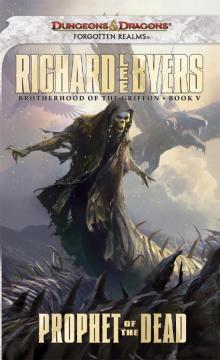 Prophet of the Dead
Prophet of the Dead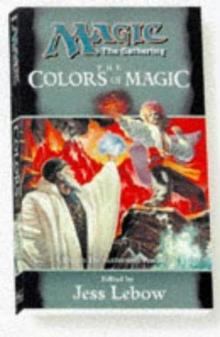 The Colors of Magic Anthology (magic: the gathering)
The Colors of Magic Anthology (magic: the gathering)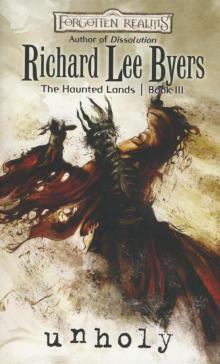 Unholy hl-3
Unholy hl-3 Unclean hl-1
Unclean hl-1 Blind God's Bluff
Blind God's Bluff Whisper of Venom botg-2
Whisper of Venom botg-2 The Spectral Blaze
The Spectral Blaze